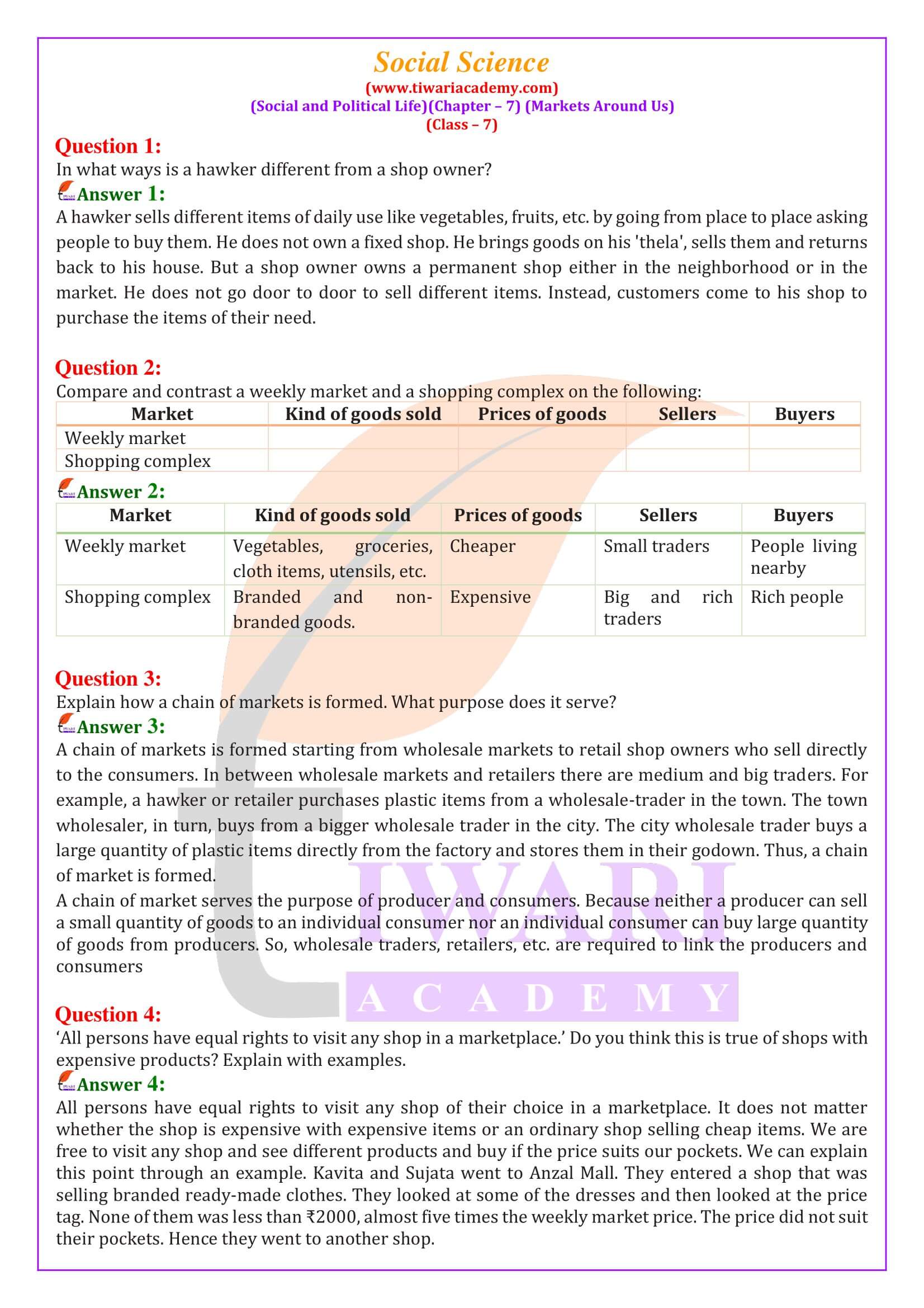NCERT Solutions for Class 7 Social Science Civics Chapter 7 Markets Around Us in English Medium and Hindi Medium free to View online or download in PDF without any login or password for year 2024-25. All the solutions are updated for the academic session 2024-25. Join us via Discussion Forum and answer to the questions asked by your friends and class mates.
NCERT Solutions for Class 7 Social Science Civics Chapter 7
Class 7th Civics Chapter 7 Solution in Hindi and English Medium
| Class: 7 | Political Science (Civics) |
| Subject: | Social Science |
| Chapter 7: | Markets Around Us |
| Session: | 2024-25 |
| Medium: | English and Hindi Medium |
Class 7 Civics Chapter 7 Question Answers
CBSE NCERT Solutions for Class 7 Social Science Political Science Chapter 7 Markets Around Us Unit 5 in Hindi and English Medium is given in updated format for the new academic session 2024-25. Download NCERT solutions 2024-25 in PDF form for offline use or use as it is without downloading online. Solutions of all the subjects are updated for new session. Hindi Medium solutions will be available for session 2024-25.
Frequently Asked Questions on 7th Civics Chapter 7
Class 7 Social Science Civics Chapter 7 Extra Questions
What is a weekly market?
A weekly market is so called because it is held on a specific day of the week. Weekly markets do not have permanent shops. Traders set up shops for the day and then close them up in the evening. Then they may set up at a different place the next day. There are thousands of such markets in India. People come here for their everyday requirements.
What is the main advantage of weekly market?
The main advantages of weekly market are that most things you need are available at one place.
Whether you want vegetables, groceries or cloth items, utensils – all of them can be found here. You do not have to go to different areas to buy different things. People also prefer going to a market where they have a choice and a variety of goods.
What are advantages of neighbourhood shops?
Shops in the neighbourhood are useful in many ways. They are near our home and we can go there on any day of the week. Usually, the buyer and seller know each other and these shops also provide goods on credit.
How are shopping complexes and malls useful for us?
There are other markets in the urban area that have many shops, popularly called shopping complexes. These days, in many urban areas have large multi-storeyed air-conditioned buildings with shops on different floors, known as malls. In these urban markets, you get both branded and non-branded goods. The companies producing these products sell them through shops in large urban markets and, at times, through special showrooms. As compared to non-branded goods, fewer people can afford to buy branded ones.
Marketing with internet. Comment.
So far we have seen different marketplaces where people buy and sell a variety of goods and services. All these markets are in a specific locality and work in a particular manner and time. However, it is not always necessary that one has to go to the market to purchase goods. You can place orders for a variety of things through the phone and these days through the Internet, and the goods are delivered at your home. Thus, buying and selling takes place in different ways, not necessarily through shops in the market.
Class 7 Social Science – Civics Chapter 7 – Important Questions
Explain how a chain of markets is formed. What purpose does it serve?
A chain of markets is formed starting from wholesale markets to retail shop owners who sell directly to the consumers. In between wholesale markets and retailers there are medium and big traders. For example, a hawker or retailer purchases plastic items from a wholesale-trader in the town. The town wholesaler, in turn, buys from a bigger wholesale trader in the city. The city wholesale trader buys a large quantity of plastic items directly from the factory and stores them in their godown. Thus, a chain of market is formed. A chain of market serves the purpose of producer and consumers. Because neither a producer can sell a small quantity of goods to an individual consumer nor an individual consumer can buy large quantity of goods from producers. So, wholesale traders, retailers, etc. are required to link the producers and consumers
‘All persons have equal rights to visit any shop in a marketplace.’ Do you think this is true of shops with expensive products? Explain with examples.
All persons have equal rights to visit any shop of their choice in a marketplace. It does not matter whether the shop is expensive with expensive items or an ordinary shop selling cheap items. We are free to visit any shop and see different products and buy if the price suits our pockets. We can explain this point through an example. Kavita and Sujata went to Anzal Mall. They entered a shop that was selling branded ready-made clothes. They looked at some of the dresses and then looked at the price tag. None of them was less than ₹ 2000, almost five times the weekly market price. The price did not suit their pockets. Hence they went to another shop.
‘Buying and selling can take place without going to a marketplace.’ Explain this statement with the help of examples.
‘Buying and selling can take place without going to a market Place.’ This statement is true at present scenario of new trend in marketing. Technology has changed the traditional concept of marketing by manual presence in the marketing to buy and sell anything. Now-a-days, it is not necessary to go to the market to purchase goods. Anyone can place orders for a variety of things through the phone or the Internet and the goods are delivered at the home or place where needed. In clinics and nursing homes we see now-a-days, sales representatives waiting for doctors or taking orders at shops for different goods or medicine. Thus buying and selling takes place in different ways, not necessarily through shops in the market.
In what ways is a hawker different from a shop owner?
A hawker sells different items of daily use like vegetables, fruits, etc. by going from place to place asking people to buy them. He does not own a fixed shop. He brings goods on his ‘thela’, sells them and returns back to his house. But a shop owner owns a permanent shop either in the neighborhood or in the market. He does not go door to door to sell different items. Instead, customers come to his shop to purchase the items of their need.




